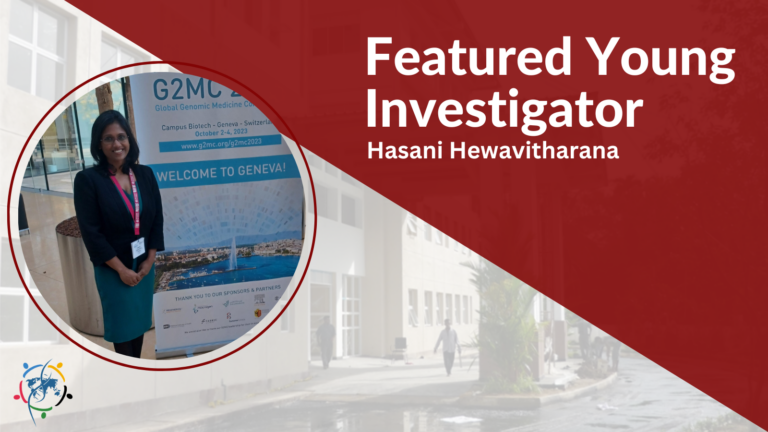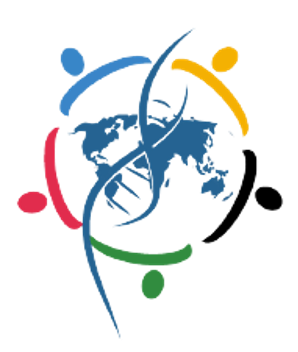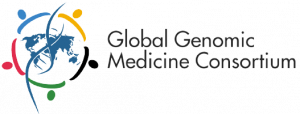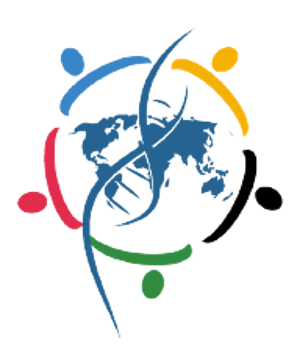
Early Career Investigator Profile: Dr Hasani Hewavitharana
Early Career Investigator Profile: Dr Hasani Hewavitharana
For this special edition of our Early Career Investigator (ECI) Series, we’re speaking with Dr Hasani Hewavitharana, whose project was voted Best Presentation at G2MC’s 7th International Conference last October.
“My presentation was on the phenotypic and genotypic landscape of a cohort of Sri Lankan individuals with inherited kidney disease,” she said. “I chose this topic because I have a special interest in nephrogenetics and I wanted to create awareness among clinicians on this lesser-discussed topic by analyzing the available raw genotypic and phenotypic data collected over the years.”
Hasani broke down her award-winning presentation, noting the significance of deep clinical phenotyping, to the contribution of a high diagnostic yield (which settled at 80%), an encouraging outcome in Sri Lanka. It was also observed that the overall referral rate in Sri Lanka was on par with the worldwide prevalence of inherited kidney disease. Still, the actual trend of referrals suggested that the prevalence was likely to be higher, with a significant number of novel variants detected, showing off the unique genetic landscape of the Sri Lankan population.
“It reinforced the importance of genetic testing as a powerful diagnostic tool in IKDs for subtype refinement, recurrence risk determination and individualized care,” she noted. “Also, this study may be used as a stepping stone to build a national registry for individuals with inherited kidney disorders in Sri Lanka.”
Hasani is an acting pediatric clinical geneticist serving under the Ministry of Health of Sri Lanka, where she provides clinical genetic services through the largest tertiary care children’s hospital in Sri Lanka.
“We currently have a bed strength of approximately one thousand, which has morphed over time to include many subspecialties providing comprehensive care and is considered the end referral point for almost all children enduring many years of the diagnostic odyssey of genetic disorders.”
When asked why she decided to pursue medicine, she gave us a quote from Australian author F. Matthias Alexander, “People do not decide their futures, they decide their habits and their habits decide their futures,” and according to Hasani, how seeing one’s child become a doctor is a dream many parents share, her upbringing was no different.
“In my younger days, it was habitual to do my best and try to excel in whatever I did, which ultimately landed me into the medical stream,” she recalls. “Along the way, I fell in love with the art of Pediatrics and the joy of seeing a child return from sickness to health. I knew I was destined to become a pediatrician, but during the postgraduate training I encountered many disparities in the care of children with genetic disorders which left me feeling helpless and out of depth, as I was only able to provide routine healthcare and did not have the necessary knowledge or training to provide specialized care, counseling, and answers these families were desperately seeking.”
It was as she described ‘serendipitous’ that she was then able to secure the only allocation for sub-specializing in genetics, a new field in Sri Lanka, which hadn’t received a board-certified consultant in clinical genetics. Hasani describes this as achieving her ‘ikigai,’ or pinpointing her intersection between purpose and joy.
All of this culminates in her eventual participation at G2MC’s Geneva Conference in October 2023 with her newly developed presentation.
“The trip was amazing,” she notes. “It’s one of those dreams where everything was just perfect for a first-time experience. For starters, it was my first time attending an international conference, my maiden visit to Geneva, and the first time I won an oral presentation at the international level.”
One aspect of the trip however, added some trepidation, “On the downside, it was also the first time I had to leave my two-year-old son back home which led me to book the earliest flight back home, well before the end of the conference.”
She recalls the peculiar way she won her award, which due to the early departure time, meant she was unable to receive it with the full acclaim it deserved. “The next morning, as I was walking out to catch my flight, one Ludy de Menten stopped me and said very bluntly that I indeed was one of the winners which was an unexpected cherry on top to the end of an already great conference, she recalls. “I was over the moon for winning but what really humbled me was the overwhelming kindness of the organizers and especially Dr Ludy for taking the time to take pictures of me receiving a dummy certificate well ahead of the awards to ensure I was not left behind.”
This award will ideally serve as a springboard for Hasani’s longer-term goals in genomics, like improving the access to high standards of care and treatments in Sri Lanka to be more on par with that of other affluent countries, which also includes future engagement in clinical trials in molecular and gene therapy. “ I hope we can shine a beacon of light to children and their families going through great hardships with uncertainty and fear of their future,” she said emphatically. “I also want to use my acquired skills to create much-needed awareness and genetic literacy among both the public and health professionals through a bottom-up approach of targeted clinical teaching and educational programs.”
Her friends, family and colleagues back home were of course thrilled with the award. Hasani consistently noted the importance of family in her life. Being outside and exploring her spirituality were also factors she considered important. “As a devoted student of yogic practices, the inward journey of finding answers to the fundamental question of ‘Who am I?’ has landed me in incredible places and gotten me in touch with amazing individuals and teachers who have improved my overall well being and functioning, both at a personal and professional level,” she said.
In closing, Hasani leaves her profile with these words; “I want to thank G2MC for its inclusiveness and for nurturing ECIs like myself through their well thought out initiatives and ground-level support to better ourselves so that someday we may be capable and deserving of taking the mantle forward,” she states. “I hope anyone and everyone who has a passion for genomic medicine, in whatever career path they may be in, finds strength knowing that organizations like this exist; are easily accessible, supportive and will provide rich ground for networking and lasting friendships, wherever they may be in the world.”





